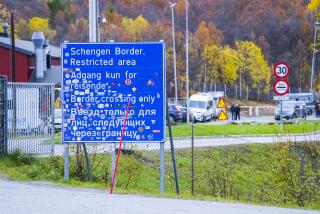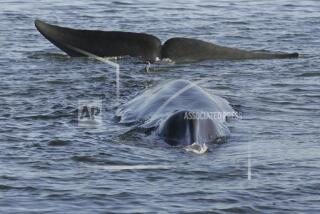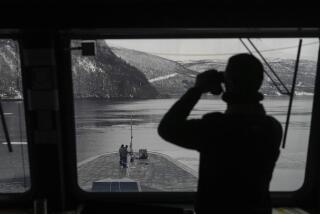Norway Is Fearsome When It Comes to Protecting Its Rights of the Sea
OSLO, Norway — They have shelled fishing trawlers, seized the ships of anti-whaling activists, wrangled with oil companies, even faced down giant Russia.
When it comes to protecting their ocean, the easygoing, diplomatic Norwegians can be Vikings.
Norwegians award the Nobel Peace Prize, sent mediators to the former Yugoslavia and brokered peace between Israel and the Palestinian Liberation Organization. They also live from the sea and fiercely protect their rights to it.
To Norway, the sea means jobs, military security, recreation and half of all exports, mainly oil, fish and shipping. Norwegians guard their patch of it zealously, as everyone from Russian submariners to trawler captains have discovered.
“We love peace, but we have to protect our rights,” Ingvard Havnen, spokesman for the Foreign Ministry, explained after a summer of conflict.
This nation of 4.3 million people claims nearly 800,000 square miles of water, an area more than six times its own size and about one-quarter the size of the United States.
“Life all along our coast has always depended on the sea,” said William Engseth, chairman of the industry committee in Parliament. “Without it, we have no resources to live on.”
Much of cold and rocky Norway is north of the Arctic Circle and only about 5% of its area is farmed. But the sea is rich.
Because of its North Sea oil fields, Norway is Western Europe’s largest oil exporter. It is a major exporter of fish and has one of the world’s largest merchant fleets--more than 1,000 ships.
“The Norwegian economy has three legs: fish, shipping and offshore oil,” said Willy Ostreng, director of the private Fridtjof Nansen Institute in Oslo. “And with such a long coastline, the ocean has always been a major security consideration.”
Norway, a member of NATO, constantly patrols its waters for possible intruders. Among those have been submarines from Russia’s huge North Fleet, which use the waters off Norway as a corridor to the Atlantic.
Such possessiveness often leads to conflict, and the Norwegians don’t always win.
This summer, oil companies grew tired of Norway’s stiff taxes and demands for at least half of all oil produced. They threatened to slow, or even halt, development of new fields.
With oil production in current fields expected to dwindle after the year 2000, Norway took the threat to heart. Jens Stoltenberg, minister of industry and energy, promised to review the rules.
Norway was less understanding about whale-hunting, resuming its commercial hunt of minke whales in 1993 and setting off what newspapers called a “whale war” with environmentalists. In resuming the hunt after six years, the government exercised its right as a member of the International Whaling Commission to reject the commission’s 1986 ban on commercial hunting.
Norwegian commercial whalers killed 206 minkes last summer. When environmentalists sailed in, determined to stop the hunt, the coast guard was waiting.
A ship operated by the militant Sea Shepherd group rammed a coast guard cutter in June, but got away. In July, the coast guard boarded and seized two Greenpeace ships.
Norwegian authorities stood their ground and the whale hunt was completed, but no sooner had the whalers returned to shore than a “cod war” began with Iceland.
The Icelanders, desperate for fish to replace their own depleted stocks, in August sent an armada of fishing trawlers to disputed waters inside the 200-mile commercial zone Norway declared around its Arctic Svalbard Archipelago.
Norway responded with gunboats. The coast guard fired on an Icelandic trawler, claiming one of its crewmen fired first. No one was injured. The trawler was boarded and sailed to shore with two holes in its stern.
More to Read
Sign up for Essential California
The most important California stories and recommendations in your inbox every morning.
You may occasionally receive promotional content from the Los Angeles Times.










